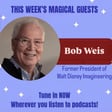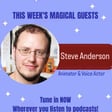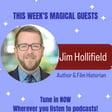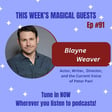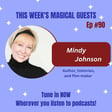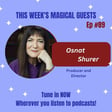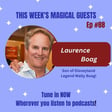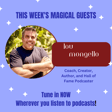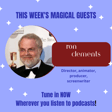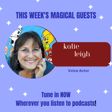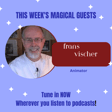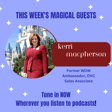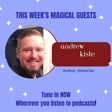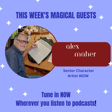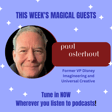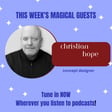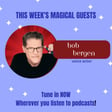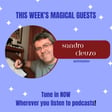Become a Creator today!Start creating today - Share your story with the world!
Start for free
00:00:00
00:00:01

Episode 82: Michael Lyons
Oh this week's episode we had the chance to sit down and chat with a Walt Disney Legacy Award winner and author with over 20 years working with Disney, Michael Lyons!
For more on Michael, check out his website HERE
DISCLAIMER: We are not an affiliate of the Walt Disney Company nor do we speak for the brand or the company. Any and all Disney-owned audio, characters, and likenesses are their property and theirs alone.
Recommended
Transcript
Introduction to Disney's Enchanting Worlds
00:00:01
Speaker
Welcome to Sharing the Magic, the podcast that takes you on a journey through the enchanting worlds of Disney. Each week, we're joined by a special guest, whether they're a magician creating moments of astonishment or a Disney expert sharing the secrets behind the magic of the happiest place on Earth. Together we'll uncover the stories, inspirations, and behind-the-scenes tales that bring these worlds to life.
00:00:32
Speaker
So, get ready to be spellbound and transported to a place where dreams come true.
Meet the Hosts: Barry and Brian
00:00:54
Speaker
Hello and welcome to another wonderful episode of Sharing the Magic. I'm your host, Barry, and tonight we have another fantastic guest that we are going to be honored and thrilled enough to hear this story and to hear his stamp on all things Disney. But before we do that, we're going go ahead and introduce our co-host tonight.
00:01:17
Speaker
And first we'll say hello to Brian. Brian, how are you doing tonight? I am doing great, everybody. Thank you, Barry, for having me. And Michael, I'm looking forward to talking to you tonight. All right. Next up, we have Chrissy. Chrissy, how you doing tonight?
00:01:30
Speaker
Oh, I'm glad to be here. A little under the weather this week, but but glad to be here and excited for our guest. All right. Thanks for being a trooper and coming on, Chrissy.
00:01:41
Speaker
All right. Next, we have Brandon. Brandon, how are doing? Hey, you're doing good. Can't be any better. You know, it's great to see all these faces and hear these voices, and I can't wait to see what Michael has in store for us today.
00:01:52
Speaker
It's going to be a good one. Just sounds like someone from Florida, and he likes all that nice warm weather that none of the country is getting. It's kind of cold, but it's chilly, but it's doable.
00:02:05
Speaker
There's on a lot of two in front of your numbers, right? No, no, no, no, no. Yeah. Not yet. All right. Next up, we have Lisa. Lisa, how are you doing tonight? Hey, Barry and everyone else. It's good to see you You know, we're at a balmy 40 here in the the grand state of Indiana. So it's just wonderful. Yeah, we're not doing so well here in the great state of North Carolina. We're only in the 50s. My other cohort from North Carolina is Jeff. Jeff, how are doing tonight?
00:02:38
Speaker
I'm doing good. I'm doing good. ah the wet yeah The weather is warm today. It's been weird. It's been the ice apocalypse. I wrecked my car like a couple weeks ago because it was snowy. Someone slid off.
00:02:50
Speaker
I slid into them. Someone slid into me. it's just been all drama all the time around here since then. But I'm doing okay. And happy, like really excited for our guest. And, ah you know... um Well, Michael, I have something for you, but to sort of introduce you.
00:03:09
Speaker
But would you rather introduce yourself or just sort of, you know, it's probably better than my soundbite.
Guest Spotlight: Michael Lyons, Disney Expert
00:03:17
Speaker
But what would you would you like me to do it or would you like to sort of introduce yourself? Because but either way, we're very excited you're here.
00:03:25
Speaker
Well, thank you. Thank all of you for this nice introduction. Great to be here with all of you and and great to be here with Disney enthusiasts. um Jeff, you can go ahead and introduce me. I would call love that. Nobody ever wants me to introduce. Yeah, well, he' it's not the greatest, but I said today we're joined by Michael Lyons, writer. And correct me, you can if I say anything.
00:03:45
Speaker
here's Here's what I have. Writer, film historian, Disney expert with a career spanning over 30 years. He's contributed hundreds of articles on film and TV, worked in leadership and and at the Walt Disney Company and co-hosts the hit podcast, Disorder, every Disney film.
00:04:05
Speaker
Um, he's also the author of drawn to greatness, Disney's animation, Renaissance, exploring Disney's legendaries nineties era. I've got to buy that book. I have, I don't own it, but I'm like, that's everything that's in that title.
00:04:20
Speaker
I love. So I'm, yeah, please. let I
Michael's Disney Inspiration and Favorite Childhood Movies
00:04:23
Speaker
got to buy it. Okay. We're thrilled to have him here. And, uh, I, you know, I do. I, I love, I'm an amateur voice guy and I do goofy once in a while. as So, Oh, Gorge. Oh, just happy to have you.
00:04:34
Speaker
Yeah. My God, that's amazing. That is a great introduction. You're hired as my agent. Wonderful wonderful having you here. just kelly great exactly Great to be here. and I know Barry and I have tried for ah ages to get this set up, so i'm so happy it finally happened. Thank you all. whole Cool, cool, cool.
00:04:53
Speaker
Well, Michael, like i said, we're glad we're we're so glad to have you here. And like I do for every single podcast that we have here, I started out this question with the same one. So you're not getting anything new.
00:05:07
Speaker
But I think it's the most important one that we ask on here is tell us about how you fell in love with Disney. Oh, gosh. Well, um I fell in love with Disney. I'm a kid of the 70s.
00:05:20
Speaker
So grew up in New York, a couple hours outside of New York City, Long Island, New York. york And apparently back back in the 70s, and I learned all this retroactively, that Disney was having trouble with a lot of their box office of their reissues of their movies.
00:05:37
Speaker
um So they decided in New York, New Jersey and Connecticut, they would have something called the Disney Summer Film Festival. And they did this from 1973 through 1978. Every summer, a movie theater would agree to be a Disney Summer Film Festival movie theater. And from the last week of June, when school got out up in New York to Labor Day weekend, right before school went back, each week would be a different Disney double feature, one live action film, one animated film.
00:06:07
Speaker
So there were double features like The Jungle Book and Swiss Family Robinson. There were some double features that made no sense, like Pinocchio and Escape to Witch Mountain. But that is how I saw all of the movies over five summers.
00:06:22
Speaker
My mom and dad took me and i was very fortunate because, you know, I got to see pretty much every Disney animated film and a lot of their live action films in the movie theater. Um, you know, and that was how, I guess that's how you streamed movies back in the 1970s. You just went to see them in the theater. And, um,
00:06:40
Speaker
That was really how I fell in love with Disney. My dad grew up as a Disney fan. um My dad just turned 91 last month, saw Snow White and the Seven Dwarfs during its original issue in 1937 at Radio City Music Hall and would tell me the story of how he ran out of Radio City Music Hall when the queen turned into the old hag and my grandmother had to go and and get him and bring him back to the the seatd So he kind of filled me with that love of Disney and that continued to um my my whole life and eventually led to me writing about Disney and working for Disney as well. But it all started with the Disney Summer Film Festival in the 70s in New York.
00:07:23
Speaker
that that That's pretty amazing because I remember, gosh, I was probably five years old in the first movie. I remember going to scene was the Jungle Book in the theater. And I remember being like, this is amazing.
00:07:36
Speaker
So and that was in the 70s as well. That was probably, I would say, probably 78. And i remember being like, this is amazing, you know. And um so growing growing up and seeing all these movies, what were some of your favorites?
00:07:53
Speaker
So Robin Hood was definitely a favorite of mine. My parents took me to see that at Radio City Music Hall in New York City with the Christmas show with the Rockettes when Radio City used to show movies.
00:08:08
Speaker
And I have very fond memories of that. Also, from what I remember, when Robin Hood came out, it was really well promoted in terms of merchandise. There were board games and plush and toy. There was everything. And I had it all.
00:08:22
Speaker
And it was, oh, there you go. Hold some of it up. Yeah. And, um you know, it was also reissued quite a bit in the 70s. So I saw it quite a bit. And I was the perfect age when it came out. I was seven years old.
00:08:35
Speaker
So you can't ask for, you know, it was just a collision of so many things. So it was really Robin Hood that made me fall in love with it. And then that kind of opened my eyes to Disney and the other animated movies and seeing them ah ah lot a lot of those summers growing up.
00:08:52
Speaker
And then as I got into, i remember when I was in middle school or junior high, I remember at is Scholastic Book Fair, they had a book by an author named Leonard Maltin called the Disney Films.
00:09:05
Speaker
And I still have my Scholastic Book Fair copy of the Disney Films. And I remember reading that. And that was my first inkling that people actually made these movies. You know, there were artists who drew these movies.
00:09:16
Speaker
And it was really the first I learned a lot about Walt Disney himself, too. so um All of that started, though, in 1973 with Robin Hood. and We have something in common because that was what really Robin Hood is it always had been very impactful in my life because and especially voice acting, because, you know, I grew up and um my family always told me it was sort of our family ah story of, you know, you have a ah cousin.
00:09:44
Speaker
His name is Pat Buttram. And. And I'm like, oh, well, who's that? And oh, the evil sheriff. And well, and that really got me. I used to just as a little kid doing his voice over and over. And and ah my grandma finally she's like, I got it.
00:10:02
Speaker
You know, my great grandma always said that. Well, she had to go fact check it. And she did a deep dive in our family history. She's like, there's no Pat. There's just some guy named Maxwell Emmett. That's Pat Buttram, okay? so So it checked out and everything. and but um and just but that i But really, i'd love I just love that Robin Hood movie. I just think yeah i watch it over and over all the time. And it to me, it's just...
00:10:27
Speaker
I think it's it's, well, you could probably tell me more about it than I could, but I just love it. I just love it. it it To me, it still captures my heart and my imagination. That's an amazing personal connection to have to the movie, too.
00:10:41
Speaker
um And yeah, Pat Butch, he did a few of voices for Disney, right? Did the the Aristocats, and and he was a voice in Rescuers as well. So that's a great story. Yeah. um Yeah, Robin is a really interesting movie from...
00:10:54
Speaker
when you when you go back and you read about it, you know, made it a a very challenging time at the studio. You know, um Walt had passed away in 66. They were trying to kind of find their footing going forward without Walt.
00:11:07
Speaker
Initially, they were going to make it very traditional with a lot of very i'm English actors in it. For a while, it was going to be more um country and Western. It was going to be set in the South, which is why I think you have this mixture in the movie of, you know, Pat Buttram along with Peter Ustinov in the same movie, you know. But I think that's what makes it really unique, too. And like you said, that a great, great voice cast in that movie, too. So, yeah.
00:11:37
Speaker
I'm glad you love i love it. I love your poster. And for our audio listeners, Michael here's got a great Robin Hood poster in his background. it's I'm very jealous of it. so And purchased at um the Disney MGM Studios back in the day. They used to have a shop when you first walked in named Sid Cahuangas that sold movie memorabilia. And that's where I found that. so Yeah, i'm so I'm sad that store's not there. Yeah, I'm sad that store's not there anymore. I used to love that store.
00:12:06
Speaker
Oh, wasn't it great? It was like a museum. You could just walk around in there forever. Yeah. You know know, I want to know, like approaching like the, the, and researching Disney history, do you have like a favorite resource or archive that kind of like sparked your interest?
00:12:21
Speaker
You know, like, you know, what, what made you move forward with things? Like what really
Literary Influences on Michael's Disney Writing
00:12:25
Speaker
sparked you? Like what kept you going? There were, um what really got me interested in writing about Disney were um other authors who had written about Disney. So Leonard Malton, ah his book was very impactful.
00:12:37
Speaker
I remember buying ah Disney Animation, The Illusion of Life by Frank Thomas and Ali Johnston, which was really written as a resource for animators because it talked about animation techniques. But just reading about that, you got really great insight from obviously two legends who knew about animation. and um And then I just continued to go down that rabbit hole back in the day when, you know, you went to the library and tried to find these books.
00:13:06
Speaker
And eventually there were authors like John Canemaker, who he's an animator himself, an Oscar winning animator, actually, he's head of the animation program at New York University. And he's written a lot of books on animation, Disney and other otherwise, he wrote one called ah Before the Animation Begins.
00:13:21
Speaker
about the animation inspirational artist. um Charles Solomon has written books. he He wrote one called Enchanted Drawings on the history of animation. John Culhane has written books for Disney and non-Disney animated books. He wrote the official books on Fantasia and Fantasia 2000. And just their all of their writing was so good because to me, it was very compelling. It was all almost novelistic. Like it was a narrative. It was taking you through this history and a lot of them, especially John Canemaker, would go into the artist's personal lives, what they had going on in their personal life, their relationship with Walt, their relationship with the other animators. And you really got a sense of, oh, this was a ah workplace like any other workplace. Like there were disagreements.
00:14:07
Speaker
You know, there was the boss. there There was, you know, ah deadlines, things they had to get done. There were pressures and anxieties. So it made it all real, too. um So just reading a lot of those authors ah really kind of wore off on me when I eventually started writing about animation myself.
00:14:24
Speaker
Okay. and And to back that up a little bit, you know, if you had like a question to ask one of them, like what, what would you ask them if you just had something on your mind, you know, and you just wanted to know more, what would that be?
00:14:37
Speaker
Yeah, I think anytime I read a book that just delves into the history of animation, my question is, where did where did you start? you know Because you know one of the books John Canemaker wrote was on Disney's Nine Old Men, so um you know the the group of the top echelon of Disney animators. And he goes into such incredible detail in each chapter. he The book is um organized in the order that each of them were hired with the company.
00:15:06
Speaker
um So, you know, I would you just love to ask him, like, where did you start to find out all of this detail? And he talks to the family members and neighbors and friends. And I think that's probably my first question. So, like, where did it start? In other words, tell me everything.
00:15:20
Speaker
before i Before I ask my question, I have to say one thing, Michael. um You spurred something in my mind. Growing up, I had an uncle. and i was in I was in New Jersey. I live in New Jersey. Danilo, New Jersey. He had a movie theater, and he had the only movie theater that showed Disney movies. So like every Sunday, he would have a matinee,
00:15:37
Speaker
And he would have double double feature, sometimes triple feature of all Disney movies. And my since I lived in a not-the-greatest neighborhood, so to keep me out of trouble, my mom would drop me off there. And i would you know he would put me to work and do things. But I watched every... like for I would say you know that entire summer, or even that that you know a good percentage of my childhood, I saw every single possible Disney movie um in those double features. And he was a big fan of the classics. And he has...
00:16:04
Speaker
In um his basement, he still has a bunch of the um the old posters and all that kind of stuff like that. So I have a big appreciation for the old films. And i but a lot lot of them I could probably repeat verbatim because I've seen them so many times. but um But my question to you is, what do you think is the most, I don't want to say maybe underappreciated or movie that you that you know that probably more people should know who are disney fans and don't seem to know you know whether it's a blackbeard's ghost or it's ah something like that that you know maybe some of us really do like but a lot of the big fans don't ever go back and look at and barry's barry's thinking too they know barry feels a lot like me on this stuff yeah barry was gonna gotta to go next you know that because yeah his wheels are spinning all right so barry here you got you know you're next buddy
00:16:52
Speaker
Are you talking just like live action and animated like all of them? Either
Underrated Disney Films Discussion
00:16:57
Speaker
or. Yeah, either or. and might Maybe one of each. If you want to give your top of each one, that would be cool. Yeah. I mean, um you brought up a great one. Blackbeard's Ghost from 1967, I think, is very underappreciated as a comedy, as a fantasy film.
00:17:11
Speaker
Peter Ustinov and Dean Jones are so good together. Amazing. i just saw I just saw it recently because i love I love that one. Yeah, it's a great one. um And they have great chemistry together. um Dean Jones does great like pantomime work when you know he's supposed to be by himself and the ghost is there.
00:17:27
Speaker
And Peter Ustinov was just, you could tell he was the king of improvisation. And if you I've seen it a lot, probably like you, Brian. And if you watch it enough, you're over Dean Jones' shoulder. He's trying not to laugh.
00:17:40
Speaker
when when Peter Ustinov is talking or improvising. um And I think it's just a really well-constructed story. I believe Robert Stevenson directed it. And and of course, he had directed something like 19 or 20 movies in the span of about two decades for Disney, including, of course, Mary Poppins and Bedknobs and Broomsticks.
00:17:58
Speaker
So very talented director. And I think that's a really underappreciated comedy and underappreciated Disney live action film. and um From um ah from the the kind of, I guess, the classic era, the one i the ones I would say to go back and look at, now that there's Disney Plus, are some of the package films.
00:18:22
Speaker
um I think about Fun and Fancy Free, which has Bongo and Vicky and the Beanstalk. Yeah, it's, you know. Bear likes to say it with the slash. There you go You know, I think there's great animation in that. I think, you know, what what kind of holds it back is it's not one consistent story all the way through. But it's just a fascinating film to watch. You've got Edgar Bergen and Charlie McCarthy and Mortimer Snurd narrating portion of it. have Dinah Shore narrating another portion of it. So it's a bit of a time capsule as well.
00:18:55
Speaker
But there's beautiful animation in the Bongo sequence and there's great animation in the Mickey and the Beanstalk sequence and great character animation, Mickey, Donald and Goofy together, like the three of them together. It's great to see them. So that's one that comes to mind that may have been forgotten about from some of those from that classic era of Disney movies.
00:19:14
Speaker
Those are great. Thank you so much. Yeah, thank you. right, Perry. Oh, man, let those wheels are a turning, my friend. I can see it.
Disney's Animation Success and Challenges
00:19:23
Speaker
Okay, well, I was going to wait a little longer before bringing this up, but um I guess first my my my biggest issue is what happened in the 80s before The Little Mermaid came out?
00:19:38
Speaker
You had the Black Cauldron. You had movies like you know that were hard to watch. It felt like nobody nobody cared cared about it. you know Now you look at it, there's a lot of aye diehard people that like it.
00:19:53
Speaker
But then you have a space between we had great movies, so then you had a hiccups like Home on the Range and Treasure Planet and Atlantis and movies like that, where movies like that, you're not going to find anything in the parks.
00:20:08
Speaker
Right. but So there's no celebratory areas for people to say, hey, look over there. There's a treasure planet, whatever. Or, hey, over here, there's a black cauldron there.
00:20:21
Speaker
So um what what was the reasoning behind it? why why I understand there were structural changes, things like that, and people like that. But it just seems like you had one great area between from the Little Mermaid through you can even add... a you know, cars and things like that from Pixar.
00:20:41
Speaker
But in that era, there was so many struggling movies. I mean, what what was the big, I mean, what was the big problem? yeah Yeah, you know, it's, it's um I wish I had the golden answer to that. my My theory is, it's ironic that Disney, part of Disney is a theme park company because the company's history has been very much like a roller coaster. Like it's gone up and down if you've looked at it.
00:21:05
Speaker
through the years and that that time after Walt's death in the 70s in the late 70s they really had some great footing they were doing great things the rescuers was a turning point it was going to be a handing over as you all know of the new generation of animators ah from from the older generation to the newer generation I think what hurt them then was, you know, there was a walkout of animators led by Don Bluth, who, of course, went on to great things on his own. But that hurt production on um Fox and the Hound.
00:21:36
Speaker
um And I think that kind of just snowballed into the 80s. And I think what started to happen in the 80s was you had all of this pent up creative energy that was there because all of these artists who were there into the 90s for the Renaissance, they were all there in the 80s just waiting for their chance. And there was no place for that creative energy to go until a new leadership team came in, which was Michael Eisner and Frank Wells and Jeffrey Katzenberg and that group that they that came in.
00:22:05
Speaker
that they were almost like a blank slate. They had never worked in animation before, and they kind of just looked at this from what they knew from live action and television, and they knew about story.
00:22:16
Speaker
And they knew that if we partner a good story with animation, that's what audiences will respond to. Audiences go to the movies to see a good story. So I think it was to change in thinking about animation.
00:22:28
Speaker
I think as we went into the 2000s and that era of Atlantis and Home on the Range and and a lot of those more challenging films that didn't see the box office that we were used to, I think what was starting to happen is that if you look at a lot of those movies, they're movies that were in production for a long time.
00:22:49
Speaker
They're movies that there were a lot of people on the screenplay. They were almost overthinking every movie. based off of the success they had had in the 90s. And sometimes, and again, just my opinion, it helps to have like one consistent creative vision on a movie because in the midst of that time, you had Lilo and Stitch, which was a big hit. um And that was Chris Sanders and Dean Dubois, I believe, were the writers and co-directors of that.
00:23:15
Speaker
And that was their baby. Like they were allowed to run with that. Whereas a lot of the other movies that wasn't the case, you know, but um that kind of they they struggled with that for a few years. But then there was the real upswing that I think started with Tangled and then, of course, grew up into Frozen and and everything after as well. So I think it's just part of a company like Disney. There's going to be ebbs and flows. It's going to go along with wherever leadership is, whatever the perspective is, whether it's theme parks, products or or movies, you're just going to see that kind of up and down in a company. Well, and That's exactly what I was going to ask you. be
00:23:51
Speaker
And then after we got to go to Chrissy and Lisa after me. But but here let me there's a book I read a long time ago was from it was called From Dawn to Decadence. And it it traced out sort of over 500 years spans how we sort of go through the dawn where it's this.
00:24:11
Speaker
big push of art and and ah in in bigger culture. Think of like the Renaissance. Think of, you know, um the Great Awakening, whatever it is. There's these big moments in our history, but then there's always the decadence.
00:24:26
Speaker
And the decadence is where we, it gets, ah and there's sort of rhythms to, to creativity and art and culture and whether they're on bigger 500 year, you know, you can zoom out and you see these patterns, but you can zoom in and maybe you can see these patterns too. And so it's not surprising to me that we have these little pockets where, you know, you got to figure things out. Some things happen and then boom, there's some sort of,
00:24:51
Speaker
um revitalization within you know the art form. And I guess my question before I... Well, here's just what popped in my head.
Will 2D Animation Make a Comeback?
00:25:01
Speaker
Do you think we are in the dawn or the decadence right now? Meaning, do you think we're in an age now where they're that we are making big strides?
00:25:13
Speaker
Or do you think we're and we're actually... Not, we're not. And do you think in the future, if we're not, do you think ah there's going to be a ah new renaissance of maybe 2D art?
00:25:29
Speaker
Do you think maybe that's coming back? Do you think some of the the things that, or or what what what do you what do you think? do Are we in the dawn? Are we in the decadence? And if we're in the decadence, ah are what is the dawn going to look like? That's my That's a great question and a great um ah great way to look at this, too. I would probably say, if I had to use those two, the the dawn or the decadence, I think we're in a bit of a decadence sliding back into the dawn. Yeah, agreed.
00:25:55
Speaker
um I feel like where Disney is now is very much where it was in the 70s after Walt passed away. you know there there's There's been tremendous success at Disney. Looking back to, it's hard to believe that Frozen has been over 10 years ago, but it has been. But if you look back at Frozen and the films that have come after, and unfortunately, a lot of Disney's more recent films have not been the successes that those have been. So I think Disney's just at a point now where they're they're trying to look to the future, if we're just talking about animation, and trying to see you know what's next for them on the horizon. I know they have a lot of sequels that are planned,
00:26:36
Speaker
But I think it might take some new leadership coming in to say, you know, maybe it's time for, you know, a new story that's out there. And how do we look at new stories, you know, to your point?
00:26:48
Speaker
And, you know, what is this going to look like in the new age of... streaming which has really kind of ruled uh you know the the movie universe uh as well and think that's kind of where they are now i think they're at some point where they're regrouping and trying to see what that where that dawn is going to to happen you know do you think that incorporates 2d animation sort of a return but in a return that's something different right so obviously it's not going to be pen and paper
00:27:19
Speaker
but it's going to be computer driven, but you know, there's a big, you know, we've we've interviewed a lot of animators on here and it's, it's, you know, their stories are amazing and, and there's such a nostalgia for just yeah the 2d animation. Do you, do you feel like maybe there'll be a sort of circuitous journey back to it, but in a way that's like, well, we're still going to use computers and you know, you're going to have to, but it's gonna, do you think there'll be a return to that style?
00:27:47
Speaker
I hope so, because I love the look of 2D animation. And I agree with you that it would most likely have to be done on a computer to look like 2D. Because um there's another podcast that's out there, the Bancroft brother Brothers podcast, Tom and Tony Bancroft, or twin brothers who worked at Disney and animation.
00:28:06
Speaker
And they were asked one time, this was a while ago, do you think 2D animation will ever come back? And they said, you know, all of the resources at the studios are gone, right? All of those animation desks and everything that they used are gone. And the new generation coming in have been trained in computers, you know, computer animation. um So I think to your point, I always think that everything seems to come back again. You know, even what was it back in like the early 90s with Unforgiven and a few other movies, the Western made a comeback.
00:28:36
Speaker
So I think I think that definitely will happen. It's going to take that one movie to break through. I've heard maybe it's done by a smaller studio. um That takes the chance of doing a 2D animated movie and it generates some positive word of mouth. And then the bigger studios kind of latch on to that and say, hey, let's let's try this. And maybe they get back to, you know, the whole perspective of the whether you do it 2D stop motion. It's really about the story. And I think once they realize that, we'll come back to it. Yeah, the story's important but yeah Yeah, and that makes sense because you think of Toy Story, that was really the big, the one that one thing that pushed 3D and then it was like, and i i remember even as a kid going to see Toy Story, it was like, oh no, this is what did movies are going to be in the future. And I like, well, we're not going to get to see cartoons anymore. Nope, you're going to watch this. Boy, were they right. So anyways, back to you, Barry.
00:29:32
Speaker
And you can, Barry, you can call on. I know we... yeah felt I always leave Lisa for last because she just asks the best questions. so I think my bigger question is, you know, we we we talked about unsuccessful movies and things like that, and...
00:29:49
Speaker
When did Disney start using big-name characters for voiceover? Because it seems like some ah some of the not-so-fortunate movies, like, for example, um Home on the Range, they use Roseanne, and they also use, I think...
00:30:10
Speaker
Judy Dench was in that as well. Yeah. um So i guess my question is, how far back did they go using big name Hollywood people to voice certain characters?
00:30:22
Speaker
And was it always successful using using them? um The first movie, I think, if if memory serves correctly, where they used well-known actors was Alice in Wonderland with the Mad Hatter and the March Hare, which was Edwin and Jerry Colonna, who obviously popular comedians at the time. If you look at a lot of movies prior to that, it was a lot of character actors, um radio actors, you know, um ah you know, if if you look at Cliff Edwards, who was Jiminy Cricket, he was pretty well known, but he wasn't, you know, a superstar.
00:30:59
Speaker
um And, you know, you know, if you even look at the voices in Snow White, there were no real like marquee names in that. I think where Disney really started to lean into it was in The Jungle Book, yeah which Yeah, because of Phil Harris. Yeah, seemed to have an entire cast that was full, you know, that was loaded. You had Phil Harris, and yeah Sterling Holloway and Sebastian Cabot and George Sanders.
00:31:23
Speaker
um And that continued into The Aristocats. And then, of course, Robin Hood, we were just talking about. It was really just. And that seemed to continue through The Rescuers because you had Bob Newhart and Ava Gabor.
00:31:38
Speaker
they They kind of moved away from that a little bit in the in the early 80s. But um I noticed they seem to have come back to it in probably the mid, early to mid 90s when animation was back on its upswing.
00:31:52
Speaker
And I think when animation became popular again, both critically popular and popular at the box office, is when some big names in Hollywood wanted to be involved in it. They they suddenly saw that, you know, these these movies are a bit at immortality, right? Because these movies will go on forever. And you got Robin Williams in Aladdin, which was a real turning point as the genie, because then, you know, every movie looked for that funny sidekick type character.
00:32:21
Speaker
In it, of course, Lion King, Pocahontas, Hunchback, they all had ah pretty big names in it. So um I think it can be traced back to Alice in Wonderland, which was a quick blip. But then I think they really leaned into it it with Jungle Book in 67.
00:32:35
Speaker
You know, and I think bringing those ah bringing those people in you know, you hear those voices and you know, it it's actually their true character. It's not just someone just coming in. Like they're bringing themselves into the video yeah in the movie. So it it it speaks just more than a voice.
00:32:51
Speaker
Yeah, in my opinion. Yeah, absolutely. And when I think what's really great, too, to Brandon's point is when the animator picks up on the performance, not so much the actor actress and bases the character on the performance. And a great example of that is Scar and the Lion King, because Jeremy Irons, brilliant performance. And Andreas Deja was the animator and picked up on the performance piece of that. And the two came together to make a character you know it wasn't it wasn't just oh here's a lion that looks like jeremy irons you know it really became a character unto himself no hello but see we we ever we have our own voice actor here man i'll tell you oh my god oh now we have more chrissy oh what would you like to say oh
00:33:44
Speaker
you You kind of pointed on it or you pointed on it earlier about the sequels, about the telling the story along with the animation. um I just kind of, you know, back to the point of my first movie in the theater as a child was a re-release of The Jungle Book. And I i remember that distinctly as a child.
00:34:03
Speaker
um But again, as as kids nowadays, these kids nowadays, it's just as easy as streaming a movie on Disney Plus. um Their parents don't have to load them in the car and take them to the theater and make that effort to go see that movie anymore. It's just a click of a button. Yeah. um So, you know, we're approaching Toy Story 5 and Frozen 3.
00:34:27
Speaker
what What are your thoughts? I mean, you kind of touched on it with Jeff's question about, you know, where we are as far as the ebbs and flows. um But what are your thoughts with with all of these sequels?
Sequels vs. Original Stories in Disney
00:34:41
Speaker
I'm just curious. Yeah. Yeah, um I think, you know, what's what's happening with Disney with the sequels is, you know, if you look back to a lot of their more recent movies that were brand new stories we'd never seen before. So I think like Raya and the Last Dragon, Strange World, Wish.
00:35:01
Speaker
um they didn't perform up to what I would think they were expecting. And i think they know that Frozen is known by audiences, beloved by audiences.
00:35:12
Speaker
um We're now getting to a point where a generation that grew up with Frozen might be bringing their own kids to see the next Frozen sequel, which is, that's some sad math right there when you start adding that up. and you know, even Toy Story. I mean, gosh, you know, generation upon generation loved those movies. So I think...
00:35:30
Speaker
Their thinking is that they have to go for the known element in animation. My hope is that knowing that those movies have a built in audience, knowing that those movies are kind of ready for success, that might help their success might help spawn, you know, something that's new or fresh or an original story that's out there.
00:35:53
Speaker
You know, sequels weren't always the thing in animation, as we know. I mean, if you go back to Walt, he made several sequels to The Three Little Pigs ah back in the 30s that didn't do well. And his famous quote is, well, you can't top pigs with pigs. And he never made sequels to any of his movies. But we're in a sequel age right now, right? Where, the you know if um you know, if a movie makes like $3 at the box office, they're like, well, part two is coming next summer, you know? So it's just it's just where we live.
00:36:20
Speaker
right now. But I think where Disney's going is we know that these these characters, these movies, these stories are beloved. We know there's an audience for this. And maybe this can help grow animation and we can kind of move towards something of original again. That's just my thought.
00:36:36
Speaker
and i And I think one of the big things is that, you know, you nailed it on the head. Phil Harris, I mean, people like that. You know, I'm a big, I like listening to old time radio.
00:36:48
Speaker
So and whenever I hear Phil Harris on there, I'm like, hey, that's the guy from, you know, Unlisted Off. And I think... A lot of it, I think it's the story itself for these movies, though, too.
00:37:00
Speaker
I mean, why do we have a Cinderella movie, but we have sequels after that? Wasn't the first one good enough? The same thing with The Little Mermaid. And I think it kind of it kind of limits the, I guess, the awesomeness of these original movies when you have all these other ones on top of that. Sometimes sequels are pretty good, though. I don't know. Every once in a while, you get a... It's usually the third one. The second one, it's like, ugh. My kids like that Little Mermaid sequel, though. For me, Aladdin, King of Thieves. was like, I loved it. That was straight to DVD. Or not DVD, it was straight to VHS. Yeah, I know. And I loved it. It was so good. But that's my question, is that we're... Like, I remember hearing someone saying there's more than four fairy tales out there, and we're always focused on it.
00:37:54
Speaker
So in in the future, where do you see movies going? Are they going to go back to fairy tales, or is it going to be more of... cultural and more of, okay, let's get stories from other countries and tell those stories. Where where do you think the future is on storytelling?
Future Directions in Disney Storytelling
00:38:14
Speaker
Yeah, well, I would, you know, there's still a lot of fairy tales out there to be mined. I mean, to your point, right? I mean, there's there's still a lot that hasn't been touched upon. And there's still a lot of um fairy tales and fables and other cultures as well that haven't been touched upon. Whenever I'm asked, like,
00:38:31
Speaker
what would you like to see Disney do a remake of? I always like i always say, I would love to see Darby O'Gill and Little People done in animation. Like I would love to see, you you know, we've never seen kind of ah the fables or or anything from Ireland in terms of like leprechauns and fairies and the Banshee and whatnot. And I always thought that would be a lot of fun.
00:38:48
Speaker
um Yeah. my My opinion is I think we're probably going to see a mix of things going forward. I think we're going to see original stories. I think we're going to see stories based on fairy tales and fables like a Tangled going forward. And I think we probably are going to see, you know, stories from different cultures around the world as well. I think that that that a lot of that has started in movies like Raya and the Last Dragon and these other movies that um Disney and other studios have done. and i think
00:39:20
Speaker
A reason we may have seen a lot of the live action remakes that you kind of touched upon is you know, Disney used to be able to reissue the movies to movie theaters every five to seven years prior to home video.
00:39:35
Speaker
And in 85, they reissued Pinocchio to home video. And then they tried to reissue it again to theaters in 92. And it didn't do that well. And they suddenly realized that once these movies are issued at home,
00:39:49
Speaker
People really aren't coming back out to the theaters to see them. But when they were reissued like that every five to seven years or five to eight years, it was a way for a new generation to go out to the theaters and rediscover them.
00:40:02
Speaker
And I don't think I think with that not happening anymore and now they're right on Disney Plus, um I think the the live action remakes are amazing. almost Disney's way of reissuing these movies and introducing the stories to a new generation. And my hope is that, you know, by these live action sequels coming, of live action remakes coming out, it generates some interest in the animated original that spawned it, maybe from the parents or the grandparents as well.
00:40:31
Speaker
It really does. it really does I mean, I'll say from, you know, family members and friends that haven't seen originals, they see the live action. They're like, okay, I have to go look at what this is about because I've never seen it. You know, that's what a lot of people do say.
00:40:45
Speaker
makes sense I guess my, one of my questions was going back to some things about you.
Michael's Career at Disney and Writing Approach
00:40:53
Speaker
um i think if I'm not mistaken, was it a 26 year career career?
00:41:00
Speaker
20, 20 year career at Disney. Yeah. ah yeah So bringing that perspective and what you learned about service and and looking at the aspects of being meticulous and all of the interviews that you've done with numerous people, um how do you mold that into your interviews?
00:41:22
Speaker
I think you could have probably came up with a lot of your own questions tonight. So I'm just curious how you use those experiences into bringing your interviews to the next level.
00:41:33
Speaker
So um that's a really great question. um I wish I had a very insightful, informative answer. But I remember when I was working as a freelance writer originally back in the 90s, my perspective in interviewing somebody like a Kevin Lima was I would think to myself,
00:41:51
Speaker
What do I want them to talk about? So I want I want to talk to Kevin Lima about how did he go from a goofy movie to Tarzan? Because that's what we're talking about. So I would design a question around that. There was almost a leading question so that you would just kind of.
00:42:08
Speaker
unfurl the question in front of them and they would just go and they would, you know, give you the information ah that you want. I think that's how I always approached designing the questions. I would just make a list of what do I want them to talk about And you know I remember probably one of the most nerve wracking, yet one of the most wonderful interviews I ever did was I had the opportunity to interview Roy E. Disney.
00:42:34
Speaker
So Walt Disney's nephew and Roy O. Disney's son. And it was for Fantasia 2000. And I remember, you know, I had plenty need to ask him about the movie, but I really wanted to ask him, you know, you've seen this company through so many different perspectives, this company that bears your name.
00:42:52
Speaker
um You've seen it through ups and downs. You've seen through through films, through theme parks. What has this been like? and and as I was writing all this down, I said, that's just what I'm going to ask him is the last question, you know? um And he went on to tell this wonderful story about...
00:43:07
Speaker
when he would grow up and he would hear his dad come home at night and he would hear the car door slam, he knew that it wasn't a good day at work. And he like started there from when he was a little kid and knew about the company and went all the way up to, you know, when he was the executive producer of Fantasia 2000.
00:43:22
Speaker
two thousand So for me, it was really, okay, what information would I want and how do i fashion that into a question? and And what's my backup question to that too? Because, you know, you don't want to ask, so what has this all been like? And the person says, great.
00:43:36
Speaker
You know, then you have to come you have to come back with something more than like, well, tell me a little bit more. you know, you have to kind of have that follow up question. But I would always start with, OK, what are the things that I would love to hear and how do I ask this?
00:43:49
Speaker
And I find so many times you have those questions and then the conversation takes you to something even even more rich. So I appreciate it.
00:44:00
Speaker
Thank you. Thank you. And you sort of already answered my question a little bit. But, well, I love, you know, Kevin Lima. i think, you know, a goofy movie was supposed to be a goof troop movie.
00:44:13
Speaker
That's what it was supposed to be. But then, unfortunately, you know, Dana Hill passed away. and And they didn't have her voice. And so they had to figure out, okay, who's going to be Max now? And it was Jason Marsden, right? And me he was, at the time, he was this...
00:44:29
Speaker
You know, he was a an actor on step by step in Full House. Everyone knew that voice. And and I remember the first time, you know, a goofy movie, that the the trailer, not the trailer, it was just the commercial came on for it. I was like, well, that's not Max. That's right. And I had no idea.
00:44:48
Speaker
But I was, my dad took me to a goofy movie and I sat there and look over my dad's like tearing up and I'm like, but oh, I loved I loved a goofy movie. And it was, but it was sort of your coming of age story, like a Ferris Bueller. It was a, it was a classical narrative about, and boy, did he just nail it. And with Powerline and, and I watch, I deep dive in all this stuff. Cause I'm a goofy, you know, I'm a goof. I, I, we've interviewed Bill Farmer. i said, Bill,
00:45:18
Speaker
I freaked him out. I'm sure I'm like there's nobody in the world that studies your voice as much as I don't study Goofy's voice. I just study Bill's voice. That's right that's great. And but um you know what what people say about a Goofy movie is Goofy is sort. He's actually the villain if you think about it in certain ways. So Max is it's this coming of age story. Well, who's the who's the antagonist?
00:45:41
Speaker
It's goofy. He's holding it him back. He's trying to. But then there's this sort of, you know, but what a beauty. I mean, Kevin Lima to direct the way he did. And I know that movie took freaking forever to to to do. And and it took to over two years and they even threatened Bill, you know, hey, if you don't if you don't.
00:46:01
Speaker
you know, act the way we want you to act or whatever. We're going to replace you with Jim Varney is what they told him. Wow. You know, and, but when it came out, it, so you, you take that, you take that coming of story. It's like, Oh, that's so good. And then you take like Tarzan,
00:46:17
Speaker
You know, it's so different, but equally, equally weird, different outside the box. But I remember I'm like, oh, they're not singing. This is this isn't a musical, but Phil Collins is playing all the time. Yeah. And boy, did that movie break my heart just as much as a goofy movie.
00:46:34
Speaker
Yeah. So what do you think in narratives like that and stories like that? There was a creative sort of punch. You know, there's something. How does that happen? That's my question. How does that happen? And I don't know. Yeah. I mean, um you know, I think, well, to answer, first off, to to go back to um Kevin Lima. So I was fortunate enough to interview him and Chris Buck in their office together ah for Tarzan.
00:47:00
Speaker
And It was really amazing to interview the two of them because Chris Buck was very outgoing, gregarious. You know, um he even said like that when he ah he'll get up on a table to act something out to like express it to the animators. And Chris Buck was very reserved and and laid back. And you could see that, you know, that yin and yang worked perfectly together. So wait, wait, so is Kevin the outgoing one or is Kevin the more subdued? Kevin was the outgoing one. Okay, that makes sense. our Yeah.
00:47:27
Speaker
And, you know, I did ask him, how what was it like going from ah a goofy movie to Tarzan? And he said, you know, in many ways, they're both very similar. He said they're about family dynamics. They're about they're about the fact that, um you know, sometimes, you know, your family can surprise you. Sometimes your family wants you to be one thing and you don't want to be that. So he... he Definitely saw some analogies there. I think in terms of story and a lot of the really powerful stories that we saw um specifically during the Renaissance era that we're talking about with movies like Tarzan, The Lion King.
00:48:03
Speaker
um There's a great quote from Don Hahn, the producer of Lion King and and Beauty and the Beast and Hunchback. And it was on the 10th anniversary DVD of The Lion King.
00:48:16
Speaker
And, you know, he would get asked all the time, why was The Lion King such a hit? And he said something. I'm going to paraphrase it. But he said, no one, I don't care who they are, makes a movie that they think is going to change pop culture. You know, it's going to influence culture and go beyond the screen. He goes, if you tried to do that, you'd fail.
00:48:35
Speaker
He said, all we have is sincerity. And when you put sincerity into what you do, and he credited that to um the great animator, Eric Larson, who was one of the nine old men.
00:48:45
Speaker
He said, Eric Larson said, all we have is sincerity. And we put sincerity into what we're doing. That comes across in the screen and that connects with the audience. And I think if you look back at the movies during the Renaissance or really any of the Disney movies or any movie that's connected with us, there's a level of sincerity there the all levels from story to acting to directing to music everything that connects with us and and vulnerability sincerity i think vulnerability because you know you think of rob even robin who's like you know he'll slow you would never hear this line well maybe you would but
00:49:21
Speaker
in my opinion you wouldn't nowadays you know when he gets an error you know he's robin hood he's just and he gets an error he's like that one almost had my name on it right yeah just that sincerity of goofy where he's like you know that was one thing it's like what you know it's like max what the heck you're trying to do It was like, what the heck are trying to do? it's just It's just sort of this like, boy, I've never heard Goofy talk like that before. Or any even ah you know Tarzan or whatever. i mean we I'm sure we can all pull examples of yeah of sort of these slow down moments where the characters, the story slows down and the characters express themselves in a vulnerable, not weak, but just a vulnerable way that really makes, it yeah it it pulls in your dang heart.
00:50:06
Speaker
Yes. It's a very human experience, right? And that's that we feel that, yeah, for sure.
The Role of Sincerity in Disney Narratives
00:50:11
Speaker
Well, well said. Well said. That was cool. All right, Barry, you're the host. i you know let's who who Who do you want? mean, y'all. It's a free conversation now. Yeah, I totally agree with you because i think, again,
00:50:23
Speaker
you know again not to harp on the the movie said didn't have a lot of success, but Treasure Planet is one of my favorite movies. And so the John Silver line where he mentions Rattle the Stars when he's talking to Jim Hawkins. And i think that's another one where, you know, it's vulnerability where it needs to be, where you're getting...
00:50:51
Speaker
A lot of times the villain, the villain would will say something that's out of line that you don't expect them to say, or or they're evil, like Scar saying long live the king before he lets Mufasa go.
00:51:05
Speaker
so what what are So what are some of the, um throughout all the movies that you've seen, what are some of the most impactful things that you've seen in in some of these animated movies? Yeah.
00:51:17
Speaker
Yeah, and well, first off, to get back to Treasure Planet, that is a woefully underrated um Disney animated movie. ah For that reason, you said it has tremendous heart in it and tremendous creativity, too, for how it was made, kind of blending the look of Treasure Island with this very science fiction look to it. um You know, at the a lot of these...
00:51:39
Speaker
A lot of the things I remember from a lot of Disney movies are those quieter moments. And there's 101 Dalmatians was the first movie I ever saw in movie theaters um during its second reissue in the late 60s when I was about three or four years old. And um there's a scene in that movie where um And we've probably all seen it. So we remember it where um they say, you know, 16 puppies. Oh, no, only 15. And then, you know, Nanny comes out and and she has the one puppy, ah you know, wrapped in the blanket and she hands it to Roger. And Roger says, but wait, I wonder. And he starts just rubbing it.
00:52:16
Speaker
And the way that they made that was absolutely beautiful because there's no music. There's just the ticking of the clock and lightning and thunder. And Pongo puts his paw up on Roger's leg and then the puppy kind of comes back.
00:52:31
Speaker
to life. And i I, you know, I think it's those quieter moments in there, like the rattle the stars speech um that sometimes are more impactful than the big action set pieces or, you know, the ah the the show stopping numbers. That sequence in 101 Dalmatians has almost no animation in it for an animated movie. um And yet it's it's a scene that I always remember.
00:52:59
Speaker
glad I came back at that moment that was no it's true it was lucky right there was yes that's right that's my favorite Dalmatian because I was like well I like lucky I don't know why just but I'm like but that scene had a a very big impact as a kid I'm like well that's my that's my favorite Dalmatian of I have 101 to choose from lucky's my favorite why well it was that moment Yeah, I remember seeing it years later in the 90s when it was reissued in theaters.
00:53:28
Speaker
And it was opening weekend when it was reissued during that summer, maybe 91 or so. And you could hear a pin drop in the theater. The theater was pretty packed. And during that scene where there's no sound on the screen or barely any sound on the screen, ah the audience even, you know, whatever it was then 30 years after it was reissued, we're still glued to the screen.
00:53:48
Speaker
yeah Yeah, and i think I think a lot of movies are like that, though. um You know, for example, Toy Story 4, before they decided to do Toy Story 5. Most of the the interaction between Buzz and Woody, when you know when they were going separate ways. And, you know, The Prince of the Frog, when Tiana's dad died.
00:54:10
Speaker
And it's just little things like that, that i love how they they throw it in there. theyre but It's not over the top. It's never over the top. Because I think a lot of times you can go in looking at it and being like, they should do a lot more here. they should do a lot more there.
00:54:28
Speaker
But I think it's just enough. It's it's like the the end of the frosting. You're just putting enough on there just for taste, just to lure you back in. You know, and I think you guys mentioned this before, Jeff, you were talking about this, the the the importance of Robin Hood, because I think Robin Hood had a lot of those in them, you know, ah with the little bunnies, things like that. you had ah the church, the church mice.
00:54:54
Speaker
were probably the most underrated characters in the whole thing. Yeah. and and And it's just like little things like that. and And it's a shame now because it just seems like all the movies now have so much vibrato in it that it's like everything's got to be on top of everything. Because i feel like I feel like that's the problem with Frozen for me sometimes. because It feels like it's like a lot of Olaf.
00:55:18
Speaker
And it's a lot of, you know, you're missing the little... the little areas within the movie itself by having you know i'm a big fan of mushu and mulan and i think his comedy overplays a lot in the movie to where he's good yeah well where right where where where it it brings it into where it's not overbearing Well, look at, but look at like ah Robin Williams, you know, his comedy, look, that it that was a great example because look, he was over the top, ridiculous, but boy, when he got freed, you know, the way he, so it's, think of a rock song, you know, when a rock song, you know, or just a song in general, when it everything's on the highs, well, then everything becomes on the low, cause it's just, it's one thing, but when there's peaks and valleys,
00:56:12
Speaker
in narrative and storytelling, boy, that just, and I think we've lost a lot of ah valleys. I think there's a lot of peaks to try to win, win, win, win audiences and to gain attention. And that, that that makes sense where we are in culture now.
00:56:28
Speaker
But I think, you know, a song that starts slow and then bam, it hits it hard and then it drops low and then it hits it hard again. Well, some of those, those can be some of the most enticing sort of addicting songs. Cause you're like, Oh,
00:56:42
Speaker
And it brings you up. It's like a roller coaster. You're down and up and you're, ah you know, you don't want to roller coaster that's just, the you're you're upside down, twist turning and you get off. You're like, well, I don't know.
00:56:52
Speaker
so You want to sort of build it up. You want to go, oh, where are we going? I don't know. and but you you go high, you go low. And some of those lows are just as powerful, I think, in storytelling than the highs are.
00:57:08
Speaker
and And just slowing it down, just to be a little quiet, is just as important, I think, as being big and extravagant and and well you know maybe the next renaissance that happens i was going to say maybe that's the maybe that's the turning point maybe it's looking back at stories that way that they're gonna it's that'll be the game changer yeah i think so and i think movies like you know there's a lot of cult uh a lot of movies that are especially in disney that are coming back that i don't think like a goofy movie is made
00:57:39
Speaker
There's goofy movie everything now. Yeah, I know. Well, there's a reason for that because people are coming back to it and going, wow, I want to watch this with my kids. And Robin Hood is one. Oh, goodness. I have Robin Hood shirts that I just go every well. Robin Hood's another one. And it's like, well, why is this resonating so much nowadays? And I think it's because of exactly what we're talking about. It's.
00:58:01
Speaker
it's that it It is storytelling that is it's exciting. um but boy, it has it's but well, it captures your heart. Yeah. Yeah. And, you know, that that gets back to ah Walt Disney himself. Right. He knew that storytelling. Walt was an innate storyteller. He knew what worked. He knew what didn't work. You know, you all know this. They were you know, he he deleted a few scenes from Snow White and the Seven Dwarfs because he knew that it wasn't progressing the story.
00:58:28
Speaker
um And he carried that storytelling perspective over to everything that he did. Live action television, even in the theme parks as well. So speaking of storytelling and the history and, you know, everything that we've heard so far, like it's been, it's been amazing. So my question is, i just want to know your thoughts of like, you know, if someone wants to follow your footsteps and, you know, write about Disney or like be included and, you know, what advice do you have you kind of give to them to get started with things because, you know, there's always ah story that, you know, that needs to be told somewhere, you know, with research, whatever, and, you know, just get them started on whatever makes them. Yeah.
00:59:12
Speaker
It's a, it's a great question. I think if you're interested in, um writing something in a nonfiction book or something on, let's say Disney history, think about something that you would like to learn more about, because if you're interested in it, somebody else is probably interested in it as well.
00:59:29
Speaker
And then in terms of writing, I would probably say a couple of things that write as much as you can. um But, you know, in today's world, Writing a book is a lot. There's a lot more possibilities than there were 20, 30 years ago. Right. There's self-publishing. There's a lot of small publishing houses, um which means a lot of us are writing as we are working full time jobs, taking care of family, doing other things.
00:59:56
Speaker
So when you write, you you need to treat it like a job. You need to say, OK, I want to write a book on. the making of disney's robin hood this is something i've always wanted to know about and i think other people want to know about it as well so um if i'm going to do this i want to give myself a deadline i want to say i'm going to work on it so much each week but then if you're working full-time you've got family other things going on um go easy on yourself you know don't say i'm going to get up at five in the morning and write for two hours before i go to work leave for work at seven if
01:00:28
Speaker
You're a person that hits snooze every morning. You know, don't say i'm going to work on it every day if you know you don't have the bandwidth to do that. Give yourself realistic expectations and start off small. You know, start off like this is what I'd like to write about. Just write the back cover of the book. You know, what would you like the back cover of the book to read like if people picked up the book? And that can be your starting point. And then the table of contents and then just kind of build ah from there.
01:00:55
Speaker
um But I would say give yourself... Expectations, treat it like a job, give yourself realistic expectations and write about what you'd like to to read, really. Yeah, because there's a lot of people these days that have really good stories.
01:01:08
Speaker
Yeah. and And a whole lot of like great backgrounds that can actually share things. So, and it, you never know, it could end up in and like a Disney movie one day. You never know. It could absolutely anywhere. So think about your own life, your own story, right? mean, you could have a story that, that, you know, that you have something to share with others and others want to hear about it. Yeah.
01:01:28
Speaker
That's cool. Thank you. Yeah, of course.
Michael's Disney Books and Freelance Journey
01:01:32
Speaker
I have so many more questions, but we need to bring you on again because i just really want to hear all your, how how well you think brother, brother bear is and all that, but we can wait that for that. every brother bear they they i will dumpling yeah Apple dumpmp dumpling guy.
01:01:52
Speaker
There you go. Any movie with Don Knotts and Bill Bixby, there's a good movie right there. Right. I just, it just, but like like everybody knows here, i mean, matt i just love the the the underdog movies. I mean, Oliver and Company and movies like that. And I i just wish that there was a way that the movies that didn't have a fighting chance at that time were put in a theater now. and Yeah.
01:02:21
Speaker
Or rep repurposed, I guess I would say, and put it in the theaters and see if if people would give it a second chance. but not but But that's for another episode because we can go on for hours. And I just get i just get too frustrated with it because...
01:02:38
Speaker
I just feel bad for the animators and people like that who worked countless hours on movies like that. Agreed, yeah. they And and and they they probably will never get a fair shake on it, and it and it's sad because it it just it just breaks my heart. Jeff, you know that.
01:02:52
Speaker
Well, I do, yeah. I know a lot of animators now, and then some of them are my good friends now. And I'll tell you what, I'm like, this is just, I mean, I just, you know, I just watch the movies again. Disney Plus, I'm like, hey, I'm going to watch Oliver and Company. I'm going watch Robin Hood. I'm going to watch. There you go. Why not? Go back and rewatch them and just, you know, I watch them over and over. And it's just, I'm not only supporting, yeah, the stuff I like, I'm supporting my friends.
01:03:18
Speaker
And there you go that's just been a wonderful thing. so Everyone who's listening, Watch Meet the Robinsons. That's all I'm saying. Yeah, no kidding. You know, when you go back and you look at stuff after you've had a conversation with someone and you learn their style and learn more about them, it actually, you can actually see that.
01:03:38
Speaker
i I've experienced it. you like You just know, like, hey, you know, anytime I see something make, you know, like animators, like a character make a certain move or like, you know, the story goes this way, you know, that's that person that created that piece of art that's amazing.
01:03:52
Speaker
Yeah, he's like, you know, like last week, I animated Darkwing Duck's cape, and I was really good at it. I'm like, now every time I watch a Darkwing Duck cape, I go, I know that guy.
01:04:06
Speaker
Yeah. yeah parents That's the beauty of this podcast, but that's just I tell you one thing. I love this podcast. I talk to all you guys all the time.
01:04:16
Speaker
Well, it's those stories. It's those individual things. And that's yeah. yes yeah but Yeah. But go ahead, Barry. I'm sorry. to me well Well, no, like like I said, this is this. This is the reason that we have this podcast. We want to know the people behind the people.
01:04:30
Speaker
And, you know, you may have worked on the Duke of West Westlson. We want it. We want it. We want to know about it. Things like that. So, Michael, ah we have to have you back on again. But before we sign off, don't you go ahead and let our listeners know where they can find you. Tell us about your website and things like that. Oh, and your book, because I just bought it.
01:04:50
Speaker
Oh, thank you. Yeah, no, I was like, OK, I'm buying this. i'd so got your friend And all your written material as well. I sent you a friend request as well because I'm like, I'm going to read it. And anyways, I sent friend request on Facebook. I'm not weird.
01:05:03
Speaker
you can You don't have to accept it. It's fine. But yeah I'd be honored if you did. As soon as we get off, I will be excited. Well, my play that would be an honor. You've got to add your book in there because I'm like, like I said earlier, when I opened up I was like, there is, oh, you're just hitting on all the good stuff that I that i i just like, you know, you said the word ninety s you said Well, I mean, it you looking, I say you can't judge a book by its cover, but you can by the table of contents.
01:05:35
Speaker
There you go. Well, okay, that your table of contents is amazing. so Oh, thanks. Yeah, so. Wow, rave review of the table of contents. There you go. And I haven't even read it. Just buy the table contents.
01:05:47
Speaker
ah this This was a pleasure being here with all of you. Thank you all for having me. um and i I'm kind of with you, Barry. I could have gone on for like another three hours talking with you all about Disney and the movies and whatnot. This is just very, very insightful, wonderful conversation. So thank you again. um And for anything and everything me, you can head over to my web website, wordsfromlions.com, L-Y-O-N-S y o n s dot com um You can learn more about my my two books. One is Drawn to Greatness, Disney's Animation Renaissance, which Jeff had mentioned, where I took all of those interviews that I did back in the 90s when I wrote about the movies for different magazines.
01:06:27
Speaker
And I utilized them in a book to tell the chronological story of that incredible time of growth in Disney animation with a lot of the movies we mentioned here tonight, like The Lion King and Toy Story.
01:06:40
Speaker
And then my second book was published last year, which is Magic Moments, Stories, Lessons, and Memories from a 20-Year Career at Walt Disney World. Which tells my journey of ah leaving life as a freelance writer ah in New York, moving down to Florida and getting a job, a frontline job as a cast member at Walt Disney World and working at Walt Disney World for 20 years. I basically worked in merchandise operations.
01:07:08
Speaker
For my 20 years there, complete shift in career. Worked in different levels of leadership, worked at all four of the theme parks, and had some wonderful experiences working for Walt Disney World for 20 years. And now I've come back to my my career has been like a figure eight. I went from freelance writer to Walt Disney World, and now I'm back to working as a freelance writer. I write for several different websites. One of them is Cartoon Research.com.
01:07:33
Speaker
And I have a weekly column there. I write a blog. um I host, co-host two podcasts. One is Disorder, Every Disney Film. The other one is From Pencils to Pixels, the animation celebration podcast. And I do copywriting and ghostwriting and all of that's out there at wordsfromlions.com. And the books are also available out there on Amazon and barnesandnoble.com as well. So thank you all again. This was this was wonderful.
01:08:02
Speaker
see see right here right here perfect example we didn't even touch anything about him working at disney right talked about all dude you have to come back on again jeff jeff right right jeff yeah yeah this has been great this has been great thank you so much attractions and and attractions and you know everything else now now we have questions about your favorites and but Oh, yeah. i'd be I'd be more than happy to come back. I got plenty of stories from those 20 years to share. Plenty of stories and plenty of insight. And those are two things that I think are just wonderful. that to I mean, again, a great just great conversation. so no there All smiles here, I'll tell you what.
01:08:43
Speaker
Otherwise known as sharing the magic. That's what we do here. and so So again, thank you, Michael. And thank you, co-hosts. And until next time, keep sharing the magic.
01:08:55
Speaker
Thank you for joining us for another enchanting episode of Sharing the Magic. We are the Thinking Fans Podcast, an edutainment show where education and entertainment collide each week. We bring you whimsical interviews with Disney guests who share their magical experiences and reveal how they are woven into the Disney fabric.
01:09:13
Speaker
Don't forget to hit that follow button to stay updated on our latest episodes. Spread the word and let your friends know they can tune in wherever they enjoy their favorite podcasts. You can also connect with us on Facebook, Instagram, TikTok, and X, formerly Twitter, at at sharing the magic pod.
01:09:32
Speaker
Until next time, keep sharing the magic.
